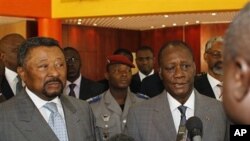Representatives of Ivory Coast's incumbent leader, Laurent Gbagbo, have rejected an African Union proposal to resolve his country's leadership dispute. A second day of negotiations is underway in Addis Ababa as a panel of five African presidents tries to mediate the dispute. The panel appears divided over how to settle a feud that threatens to push the world’s top cocoa exporter back toward civil war.
Members of the AU high-level panel on Ivory Coast brushed aside reporters’ questions as they arrived for day two of difficult talks. When cornered, the usually vocal AU Commission Chairman Jean Ping pleaded that only the presidents on the panel could speak.
"They will tell you. No, they will tell you for sure because you have presidents there and they like to speak and they will speak. Me, I am not allowed to speak too much," said Ping.
The African Union acted forcefully last December, suspending Ivory Coast’s membership when it became clear that Gbagbo was refusing to step down after losing a runoff election to challenger Alassane Ouattara.
Since then, however, the continental organization has wavered in its support for the internationally accepted election result.
The high-level panel meeting in Addis Ababa is said to be split between those insisting Ouattara is the legally-elected president, and others - including South African President Jacob Zuma - who reportedly favors a power-sharing deal similar to those negotiated in Zimbabwe and Kenya.
Gbagbo rejected the efforts of an early AU mediator, Kenyan Prime Minister Raila Odinga, refusing to see him after he made it clear results of the election would have to be recognized. Odinga later was fired after he told reporters Gbagbo was trying to overturn the people’s will.
Cote d’Ivoire symbolizes the great tragedy that seems to have befallen Africa, whereby some incumbents are not willing to give up power if they lose. This refusal is particularly egregious in Cote d’Ivoire’s case, since never has there been such internal, regional and international unanimity among independent institutions about the outcome of a disputed election in Africa.
Odinga was widely regarded as the winner of Kenya’s disputed 2007 election, but became prime minister after a power-sharing deal was struck with President Mwai Kibaki.
Zimbabwe’s President Robert Mugabe, also kept power through an agreement negotiated by South Africa after an apparent electoral defeat. Mugabe arrived in Addis Ababa Thursday for a specially-called heads of state level meeting of the AU Peace and Security Council on Ivory Coast and Libya. That meeting begins after the mediation panel completes its debate.
Before he was fired in January, Kenya’s Odinga called power sharing negotiations damaging to democracy.
"Africa will never have a stable political base unless we internalize the democratic culture of ceding power after losing in a competitive electoral process," said Odinga. "If one’s vote does not count in determining who will lead a nation, which is the most elemental dimension of democracy, elections will become meaningless, democracy will lose its luster, and the future will be riddled with widespread unrest and instability."
Prospects for a positive outcome of the latest mediation effort dimmed when Gbagbo decided not to attend. He sent a delegation instead, led by former prime minister Pascal Affi N'Guessan, who heads Gbagbo's Ivorian Popular Front. N’Guessan Thursday described as ‘unacceptable’ an AU proposal calling for an orderly transfer of power to Ouattara.
Ivory Coast's Gbagbo Rejects AU Mediation Proposal




